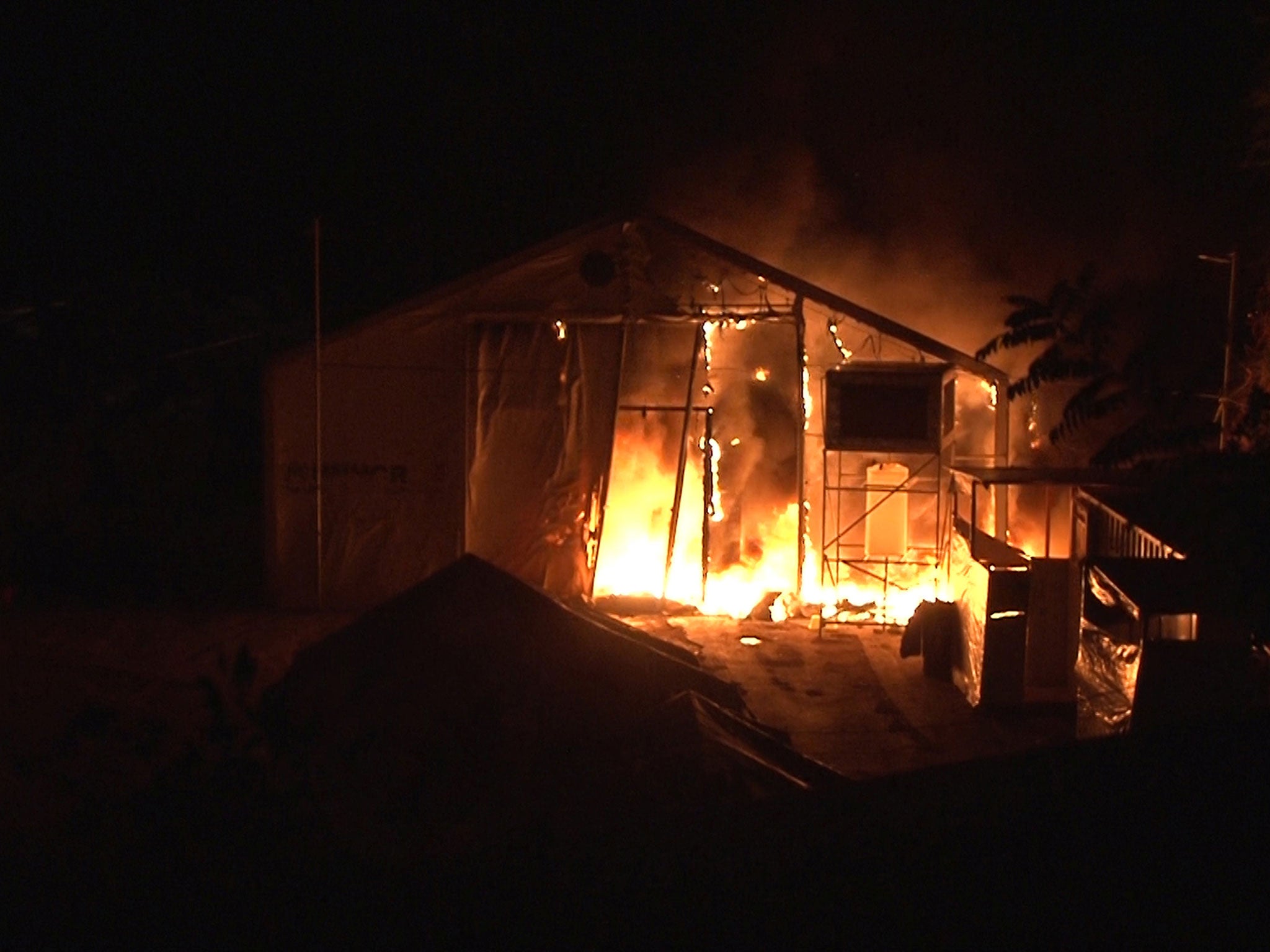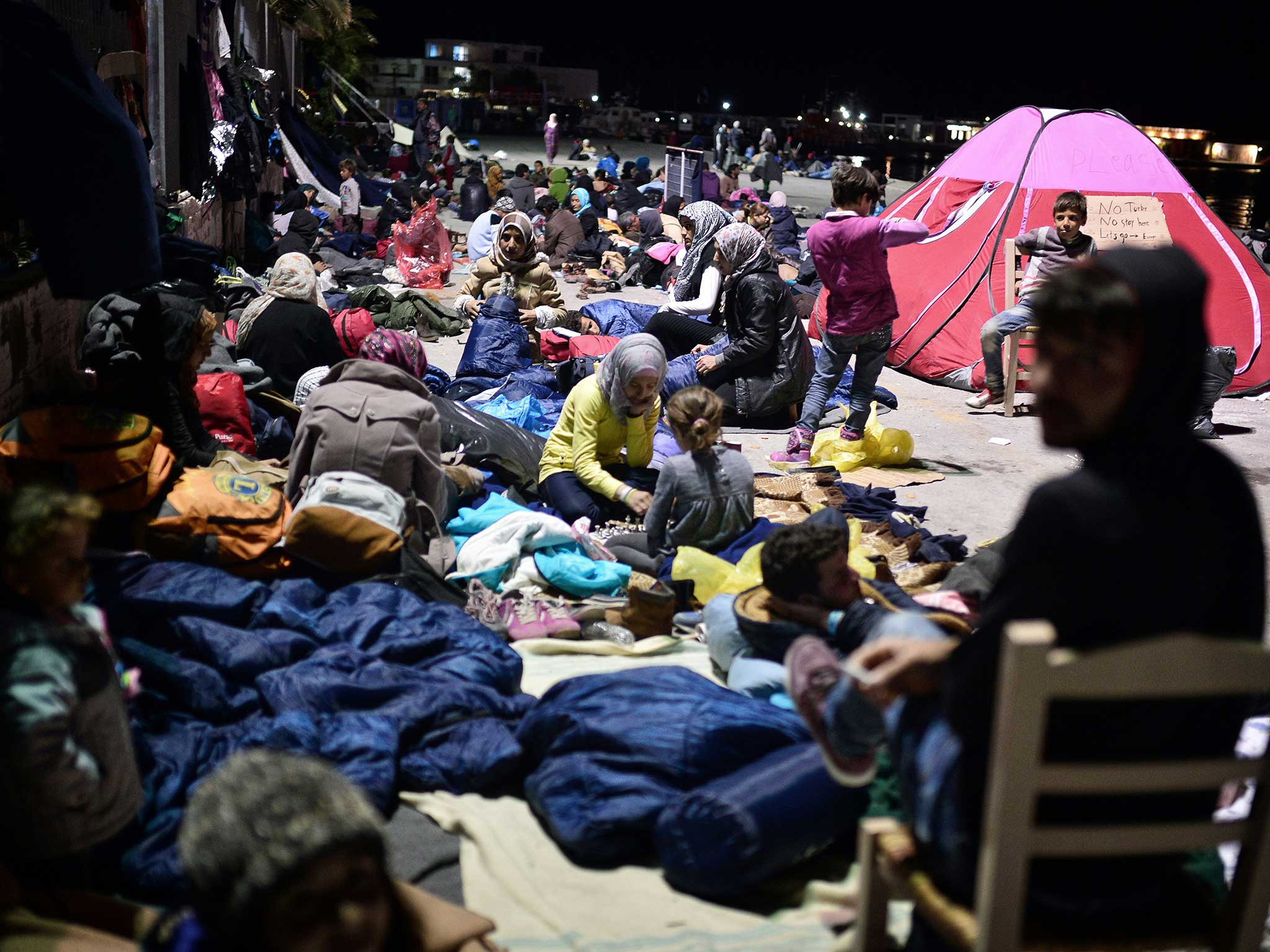Far-right mob attacks refugee camp with Molotov cocktails and rocks on Greek island of Chios
Rock seriously injures Syrian man as gang beats volunteer aid workers in Souda
A far-right mob armed with Molotov cocktails and rocks has attacked a refugee camp where hundreds of men, women and children are being held in Greece.
A Syrian asylum seeker was seriously injured in the violence at Souda on the island of Chios, where two volunteers were also beaten by a 30-strong gang as fires swept through the tents, destroying shelters used by 100 people.
Footage showed United Nations-branded tents burning as refugees attempted to stamp out flames in the darkness, with masked men armed with baseball bats prowling the camp.

Boulders and firebombs were launched from a medieval fort that overlooks the camp, police said. One rock seriously injured a Syrian man when it was thrown from above.
The UN Refugee Agency (UNHCR) said there had been several other violent incidents earlier in the week, leaving residents too scared to return to the site as winter temperatures plummet.
“I strongly condemn any acts of violence, resulting both in the local population and the refugees being seriously hurt,” said Philippe Leclerc, the UNHCR’s representative in Greece. “All perpetrators of such acts should be found and brought to justice.”
He called on local authorities, who operate Souda, to prevent future attacks by reinforcing security and to increase efforts to find alternative accommodation for families sleeping in tents for several months while waiting for their claims to be processed.
The UN is already providing hostels and apartments for more than 300 of the most vulnerable asylum seekers and has transferred 400 more to the Greek mainland since the end of September.
Family-sized tents are being built for the victims of the fires, with aid workers distributing emergency blankets, sleeping bags and hygiene kits.

The attacks followed several disturbances at the Souda camp in recent months and came just days after members of Golden Dawn, a far-right Greek party accused of nao-Nazi links, visited Chios and called for migrants to be removed.
A local official said the island was “seething” over the presence of about 4,000 refugees and migrants across three camps.
“We cannot exclude that far-right groups are seeking to exploit local anger,” he told AFP.
Thursday’s attack was being viewed by local media as a reprisal for events on the previous evening, when groups of migrants broke into an off-licence and stole fireworks from another shop, setting them off to target local homes and cars.
Three Algerian teenagers and an Iraqi man in his forties were among 37 people detained over ensuing clashes between migrants, local residents and the police.
Chios is one of several Greek islands holding more than 16,000 migrants and refugees as part of the conditions of the controversial EU-Turkey deal.
The island camps have an official capacity of fewer than 7,500, with aid agencies warning of overcrowded and unsanitary conditions.
Médecins Sans Frontières (MSF) said more than 50,000 people were living in substandard conditions across the country, including victims of violence and torture, those with chronic diseases and psychiatric disorders, disabled people, unaccompanied children, pregnant women and newborn babies.
“The people we work with have been through unimaginable trauma in their home countries and on the journey to Greece,” said Christina Sideri, an MSF psychologist.
“For them, being blocked in Greece is like being in an open-air prison. Moreover, the asylum process is so slow that many will have their first asylum appointment in April, May next year.
“This delay and the uncertainty this means for their future is devastating.”
Tensions are running high among migrants unable to continue their journeys to Western Europe, with 61,000 people trapped in Greece by a series of border closures through the Balkans.
Many face deportation back to Turkey if their asylum claims are not accepted, as part of the March agreement, with Britain and several other European nations refusing to resettle those arriving in Italy and Greece according to quotas.
Additional reporting by agencies
Join our commenting forum
Join thought-provoking conversations, follow other Independent readers and see their replies
Comments